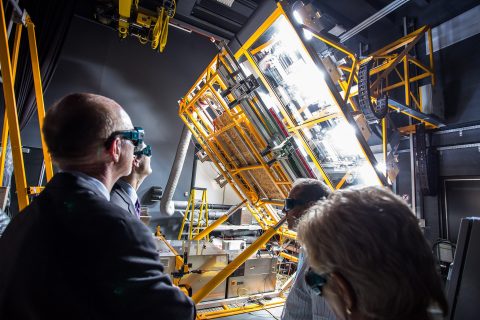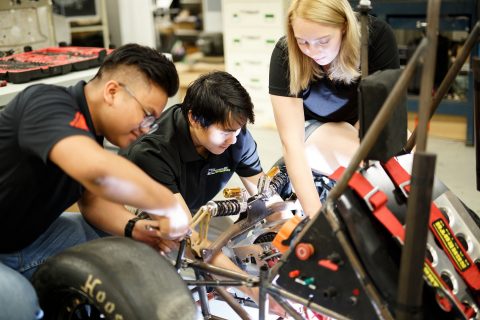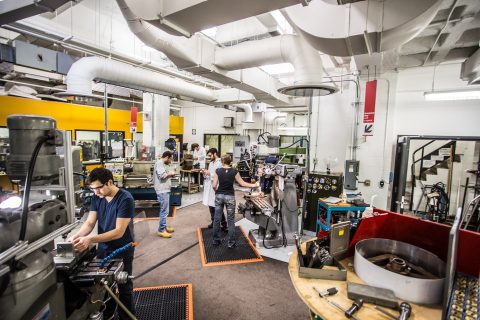Building Engineering (BEng)
Why study Building Engineering?
Buildings are more than just structures: they shape how we live, work and interact with the world. With nearly 40% of global carbon emissions coming from the built environment, there’s never been a more urgent need for building engineers who can lead the transition to net-zero energy and climate-adaptive infrastructure.
By enrolling in the Gina Cody School, you’ll be joining Canada’s oldest accredited Building Engineering program, established in 1982. Our program bridges architecture and engineering, integrating civil, structural, mechanical, electrical and lighting systems in our courses.
At Concordia, you’ll develop the technical skills, sustainability mindset and hands-on experience to drive real change in the industry. As a building engineer, you’ll play a critical role in designing smart, energy-efficient and climate-resilient buildings that enhance occupant well-being while minimizing environmental impact.
Program highlights
- World-class research & facilities
Work alongside leading researchers in net-zero energy buildings, wind engineering, HVAC systems and building performance using globally renowned labs like the Solar Simulator Environmental Chamber - Hands-on learning
Through co-op placements, summer research and student-led initiatives, you’ll gain real-world experience before you graduate - Passionate student societies
Expand your horizons beyond the classroom with consulting competitions, networking events, software tutorials and more created by students, for students - Industry connections
Join an alumni network shaping the future of built environments across major consulting firms, government agencies like NRCan and NRC, and leading universities worldwide
Special funding for out-of-province students
Up to $4000 for undergraduate programs.
Program structure
The Bachelor of Engineering in Building Engineering takes a minimum of four to five years (120 – 150 credits) of full-time study, depending on your academic background. While many students follow a four- or five-year path with summer terms off, others accelerate their progress by taking additional courses per semester, allowing for earlier completion.
Program requirements
Integrated path
Get a head start on graduate studies. As an undergraduate student in Building Engineering, you can take up to sixteen credits that count towards both your Bachelor of Engineering and a Master of Engineering (MEng) in Building, Civil, Construction Engineering and Management and Environmental Engineering.
Courses
The curriculum consists of the Building Engineering core and electives.
Sample projects
- Built for the North: A housing project designed for cold climates, integrating low-carbon renewable energy and Inuit cultural practices. Earned 3rd place in the U.S. Department of Energy’s international Solar Decathlon Design Competition
- Life-cycle net-zero mid-rise: A wood-frame condominium using modern HVAC and energy technologies, designed to achieve net-zero energy over its lifespan
- Mixed-use high-rise: A building that combines residential units and commercial spaces, optimizing shared facilities and energy use for greater efficiency and sustainability
- Historic landmark community centre retrofit: A heritage building fully modernized to meet current codes and community needs — structural reinforcements, upgraded envelope and HVAC systems — all while preserving its original character and charm
Co-op program
The Co-op program gives you the chance to complete paid work terms that last 12 to 16 weeks. As a Co‑op student, you will work for engineering firms where you may:
- Inspect work on a large renovation project, e.g. Place Du Portage government complex
- Plan the construction of one of the latest REM transit stations
- Produce AutoCAD drawings
- Prepare plans for electrical and ventilation systems
- Conduct energy audits of existing buildings
- Visit project sites to monitor progress
- Conduct building inspections
Admission criteria
Minimum cut-off averages and course requirements
- Quebec CEGEP: 23 overall, 23 math, 22 physics
- Admission is based on applicants’ overall, math and physics CRC indicated above and completion of the following classes as part of their DEC: General Chemistry 1; Calculus 1 and Calculus 2 and Linear Algebra; Mechanics and Electricity and Magnetism.
- Students completing one of the eligible technical DECs may qualify for admission without the listed prerequisites. However, if the prerequisites are taken, a minimum of 23 in math and a 22 in physics are required.
- Eligible technical DECs include 221.B0, 221.A0 or 221.C0
- Advanced standing may be possible
- Additional information for CEGEP applicants
- High school: C+ overall, B- in math, B- in physics
- One math from Pre-Calculus, Calculus, or equivalent
- Grade 12 or university-preparatory physics
- Canadian curricula course requirements
- Accepted international qualifications
- ACT or SAT is not required
- AP exams are not required but may qualify you for advanced standing
- Indigenous Bridging Program: First Nations, Inuit and Métis students who do not meet Concordia’s conventional admission requirements may be eligible for admission through the Kaié:ri Nikawerá:ke Indigenous Bridging Program
- International Baccalaureate (IB) diploma: 26 overall, 4 HL or SL math, 4 physics
- one math (Applications and Interpretations HL, Analysis and Approaches HL or Analysis and Approaches SL)
- one of the math or physics courses must be completed at the HL level
- International Baccalaureate Career-related Programme (CP): 4.5/7 overall, 4 HL or SL math, 4 HL or SL physics
- one math (Applications and Interpretations HL, Analysis and Approaches HL or Analysis and Approaches SL)
- one of the math or physics courses must be completed at the HL level
- Additional Career-related Programme (CP) course requirements
- Baccalauréat français: 11 overall, 12 in math, 12 in Spécialité Physique-chimie
- Required courses:
- Première: Spécialité mathématiques and Spécialité physique-chimie
- Terminale: Spécialité mathématiques (also accepted, Spécialité Physique-Chimie and Mathématiques Complémentaires)
- Additional information for Baccalauréat français applicants
- Required courses:
- British system of education (GCE):
- A-levels: At least two A-level exams CD, C in math, C in physics or
- AS-levels: At least 4 AS-level exams with equivalent results or
- BTEC: Level 3 Diploma or Extended Diploma in a related subject area with equivalent results
- Students without math or physics A-levels may be admissible based on AS-level or iGCSE/GCSE/O-Level exam results. Students should include all their exam results from iGCSE (or equivalent) onwards to support their application.
- Additional information for British System of Education (GCE) applicants
- University transfer (internal): 2.5 overall, 2.5 in math/physics, 1.70 in courses offered by the Gina Cody School of Engineering and Computer Science
- PHYS 204 or 205 (or equivalent)
- At least two of the following (or equivalent): MATH 203, 204, 205
- University transfer (external): B- overall, B- in math, B- in physics
- Courses in the disciplines of Calculus, Chemistry and Physics
Minimum cut-off averages should be used as indicators. The cut-off data may change depending on the applicant pool. Applicants who meet the stated minimum requirements are not guaranteed admission to these programs.
Application deadlines

FALL ENTRY (September)
Deadline: March 1
U.S. and international applicants: Apply no later than February 1 to allow time for immigration document processing. However, applying earlier is strongly recommended. Immigration processing times vary by country and delays could prevent you from starting your studies on time.

WINTER ENTRY (January)
Deadline: November 1
U.S. and international applicants: Apply no later than August 1 to allow time for immigration document processing. However, applying earlier is strongly recommended. Immigration processing times vary by country and delays could prevent you from starting your studies on time.
We reserve the right to close admission to a program at any time after the official deadline without prior notice.
Funding note
United States students: A U.S. Federal Student Aid-eligible version of this program is offered. This version meets all U.S. regulations (such as no co-operative education or e-courses) for eligible programs.
After your degree
Building Engineering graduates work in a range of industries, helping design, construct and operate sustainable and resilient buildings. You can find career opportunities in:
- Engineering consultancies like WSP, Stantec and CIMA+
- Transit agencies such as EXO and STM
- Utility companies like Hydro-Québec
- Construction firms like Kiewit and Pomerleau
- Municipalities, government infrastructure departments and natural resources agencies
Our alumni have built careers at leading organizations including GHD, Siemens, AECOM, Hatch and PCL.
Student story

Elsa Younes
Bachelor of Engineering Option: Building Energy and Environment
Elsa's involvement in student groups provided valuable skills beyond the classroom and fostered lasting friendships.
Other programs of interest

Protect water resources. Design buildings, bridges and tunnels. Improve transportation and traffic flow. As a civil engineer, your expertise in urban and environmental planning lets you guide municipalities to create the structures and systems that have a positive impact on everyday community life.
Department
Department of Building, Civil and Environmental Engineering
Faculty

Build engines. Design robots. Control explosions. As a mechanical engineer, you will create, construct and control machines. Whether it’s a vehicle, an aircraft engine or an assembly line, mechanical engineers know how to fit that square peg into a round hole, and do it with a little finesse.
Department
Department of Mechanical, Industrial and Aerospace Engineering
Faculty

Use your knowledge of human behaviour, equipment, information and modes of communication to develop processes that work. Industrial engineers are experts in optimization who apply mathematics, engineering and psychological principles to improve productivity, safety and quality. A knack for project management can lead to a career in many different economic sectors.
Department
Department of Mechanical, Industrial and Aerospace Engineering
Faculty

